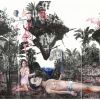KARYA SENI
| Pelaku Seni | : | Entang Wiharso |
| Medium | : | Canvas, Oil paint |
| Tahun Pembuatan | : | 2012 |
| Dimensi Karya | : | 300 mm x 600 mm x mm |
| Deskripsi | : |
Dicuplik dari Rilis Pameran ENTANG WIHARSO: Untold Stories di Arndt Gallery, Berlin, 9 Juni - 8 September 2012: A figure lies rigid on the ground as if bound to the spot. Head in profile, his sharp gaze is directed out toward the viewer. His expression is one of quiet apprehension and uncertainty, perhaps even fear. Slightly behind him sits another, smaller figure. She draws our attention to the closed umbrella grasped in her loved one’s left hand. The two figures, perhaps they are lovers, partners, are situated within a landscape that is both fertile and desolate. Painstakingly detailed foliage of tropical plants painted in silhouette, and the rugged barren hills upon which they grow are rendered in inky blacks. Watery streaks cascade down, seemingly eroding away waking reality. Floating above the scene are three islands roughly carved from the landscape below, water coming to take their place. One of them has come under attack, several kris (Javanese dagger) remain wedged in its surface. The distorted and dismembered bodies that inhabit these islands are in a palette of pasty reds and bubble-gum pinks. Cords, lifelines, bloodlines or bowels connect all the elements, and seem to end and begin with the male figure as if he dreams the world into being. The above refers to the large triptych, 'Untold Story: Floating Island, 2012', an autobiographical work that brings together all the complex of figures, archetypes, and composite portraits to be found throughout Untold Stories, Entang Wiharso’s first solo exhibition with ARNDT Berlin and in Germany. The title of the exhibition is taken from the book Pak Harto: Untold Stories, which is part of an effort by family and remaining supporters to posthumously re-fashion and put a more positive spin on the image of Suharto, the second and ousted President of Indonesia, whose authoritarian regime of more than three decades ended in 1998. The disclosure of personal experiences and events, as well anecdotes and photos taken from private collections integrates the micro-politics of a man’s personal life with the macro-politics of the nation. Appropriating the book’s title for his own exhibition is Entang’s response to what he sees as a false image. He also subtly taps into its inherent appeal of ‘personal disclosure’. Like in his previous works, the artist posits his role and position as both story and storyteller, as storyteller embedded in the story. |
